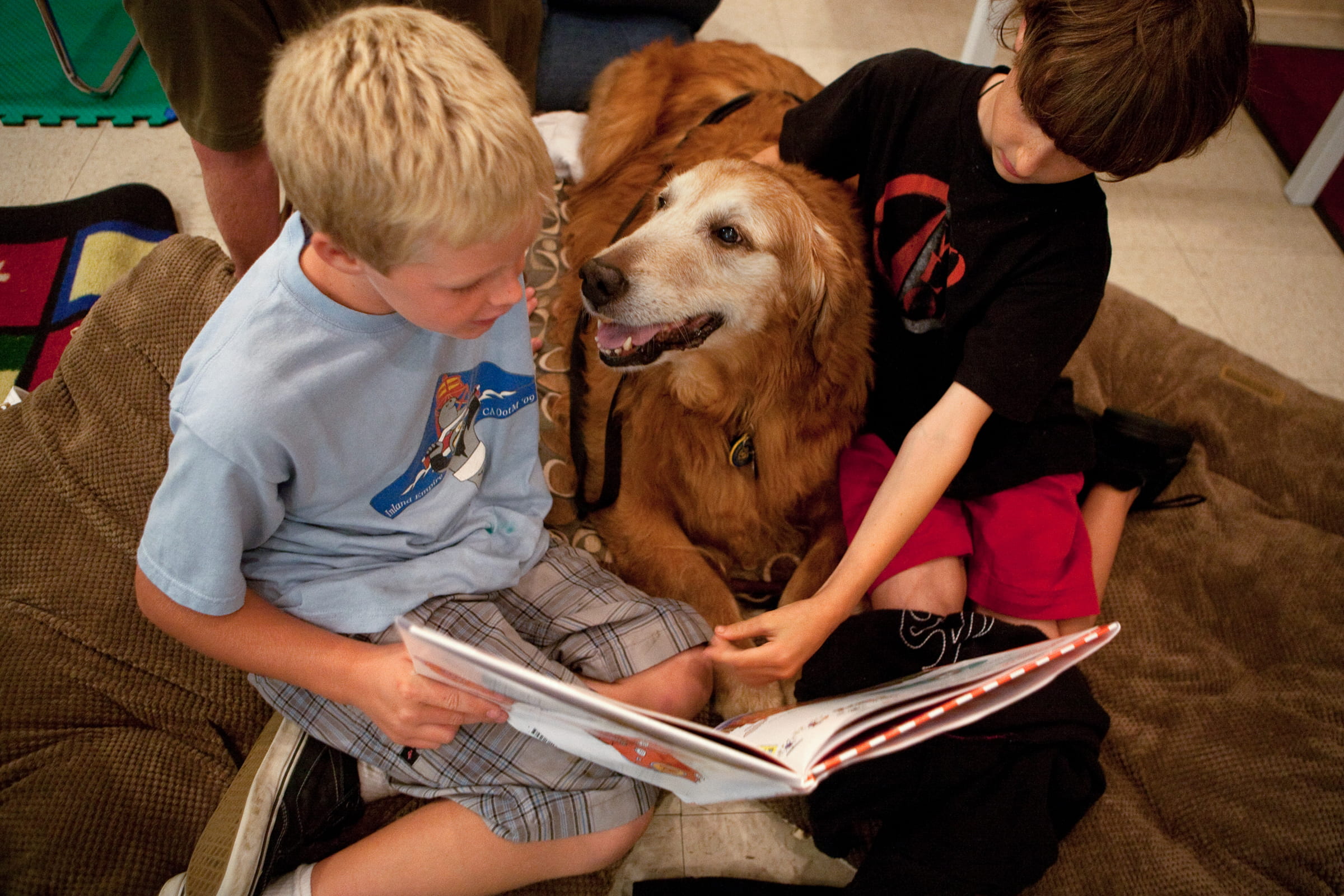Different breed of therapist

Cinder, a golden retriever with a sweet face and slow gait, reclines on a dog bed at the UC Irvine Child Development Center as, one by one, half a dozen 8- and 9-year-olds deliver pats and hugs. One boy puts his arms around her in a warm embrace; another gently curls up at her side. From behind a two-way mirror, center director Sabrina Schuck watches closely.
“All of these kids have attention-deficit/hyperactivity disorder. They’re an aggressive group. A couple of them are at risk of suspension from their school,” she says. “Yet they’re calm and engaged.” The reason, she says, is Cinder — and other therapy dogs.
Schuck, a UCI alumna and assistant clinical professor of pediatrics, leads a four-year, $2.2 million study to learn whether pet therapy can help children with ADHD improve their social skills and control their symptoms.
“We’ve heard all of this anecdotal evidence that, ‘Oh, dogs are good for kids with ADHD,’ but there haven’t been any studies,” she says. “Our goal is to answer these claims with empirical research.”
To determine if dogs really are good medicine, UCI behavioral specialists and teachers — most of them graduate students — hold twice-weekly social skills sessions for 12 children. The center uses a reward system to reinforce the youngsters’ positive behavior.
“We tell them when they’re doing things right constantly,” Schuck says. “These kids need more positive feedback than other students.”
When they behave well, half the group gets some face-time with Fido. They can take a break to pet or play with one of the visiting pups.
“They know that the more they participate in the training, the more they can hang out with the dogs,” Schuck says. A control group receives the same training, but their reward is being allowed to cuddle stuffed animals.
Schuck carefully screens certified pet therapy dogs from the Orange County SPCA and Delta Society for the study, and their handlers assist during the sessions.
“We believe there are dog personalities that attract certain human personalities, and we provide three different types,” she says. “The kids get to choose which dog they want to play with. Some prefer a docile old retriever like Cinder. You can see them relax while they’re petting her. Others think that’s boring.”
More active children prefer Sammi, an Australian shepherd who loves to play catch. And for those who like to give directions, Schuck brings her own golden retriever, Bristol, who performs tricks. Teaching kids how to give the dogs simple commands is part of the training.
“One parent said it’s made all the difference in the world,” Schuck says. “She told me, ‘Now my child knows how I feel when I ask her to brush her teeth and she won’t do it.'”
Youngsters with ADHD tend to become easily distracted, forget things and have trouble following instructions. Left unchecked, their symptoms can impair their lives.
“They talk too much in class and get kicked out. They have trouble making friends. They have difficulty regulating their emotions. A lot of them lose it and have temper tantrums,” Schuck says. “They’re more at risk of abuse from their parents and failing at school.”
None of the children in her study are on medication, either because they can’t tolerate it or because their parents want to find drug-free methods of controlling symptoms.
“These kids have a special place in my heart because they have so much potential,” says Schuck, who began working at the CDC at age 19 while earning a bachelor’s degree in psychology. (The center specializes in treating children with ADHD and related behavioral and learning problems, but none participate in the dog research.)
She launched the study in July 2010 and says she’s already seeing evidence that the children do indeed benefit from being around dogs. “I don’t know if it’s reducing their symptoms,” she says, “but it’s lowering stress on the child and the whole family system.”
Instead of being a distraction, the canines have a calming effect that helps the kids focus on tasks such as reading and writing. The dogs also assist with their social skills. “They take down the children’s defenses,” Schuck says. “Those who have social challenges can relate to them.”
Jean Sivcovich, a Mission Viejo resident whose 9-year-old son, Dillon, is in the study, says there has been a marked improvement in his behavior. “It’s had an amazing effect,” she says. “He’s able to sit still more, and he’s easier to control. He’s definitely calmed down a lot. And he’s more assertive in class. His voice is stronger.”
Dillon has also gone from disliking dogs to adoring them, his mother reports, and he looks forward to the sessions rather than dreading them.
“Parents tell me their kids love coming here to be with the dogs,” Schuck says. “Of course, I don’t hear that from the non-dog group.”
Schuck’s study has, however, had one unintended consequence: “We have a lot of these kids asking their parents if they can get a dog,” she says.
Originally published in ZotZine Vol. 4, Iss. 4